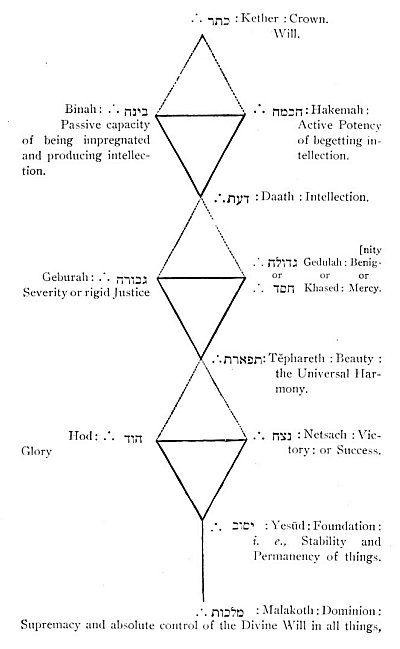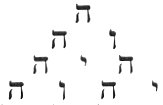The Clarian Oracle, which was of unknown antiquity, being asked which of the Deities was named ΙΑΩ, answered in these remarkable words: “The Initiated are bound to conceal the mysterious secrets. Learn, then, that ΙΑΩis the Great God Supreme, that ruleth over all.”
The Jews consider the True Name of God to be irrecoverably lost by disuse, and regard its pronunciation as one of the Mysteries that will be revealed at the coming of their Messiah. And they attribute its loss to the illegality of applying the Masoretic points to so sacred a Name, by which a knowledge of the proper vowels is forgotten. It is even said, in the Gemara of Abodah Zara, that God permitted a celebrated Hebrew Scholar to be burned by a Roman Emperor, because he had been heard to pronounce the Sacred Name with points.
The Jews feared that the Heathen would get possession of the Name: and therefore, in their copies of the Scriptures, they wrote it in the Samaritan character, instead of the Hebrew or Chaldaic, that the adversary might not make an improper use of it: for they believed it capable of working miracles; and held that the wonders in Egypt were performed by Moses, in virtue of this name being engraved on his rod: and that any person who knew the true pronunciation would be able to do as much as he did.
Josephus says it was unknown until God communicated it to Moses in the wilderness: and that it was lost through the wickedness of man.
The followers of Mahomet have a tradition that there is a secret name of the Deity which possesses wonderful properties; and that the only method of becoming acquainted with it, is by being initiated into the Mysteries of the Ism Abla.
H∴O∴M∴ was the first framer of the new religion among the Persians, and His Name was Ineffable.
AMUN, among the Egyptians, was a name pronounceable by none save the Priests.
The old Germans adored God with profound reverence, without daring to name Him, or to worship Him in Temples.
p. 622
The Druids expressed the name of Deity by the letters O∴I∴W∴
Among all the nations of primitive antiquity, the doctrine of the immortality of the soul was not a mere probable hypothesis, needing laborious researches and diffuse argumentation to produce conviction of its truth. Nor can we hardly give it the name of Faith; for it was a lively certainty, like the feeling of one’s own existence and identity, and of what is actually present; exerting its influence on all sublunary affairs, and the motive of mightier deeds and enterprises than any mere earthly interest could inspire.
Even the doctrine of transmigration of souls, universal among the Ancient Hindu_s and Egyptians, rested on a basis of the old primitive religion, and was connected with a sentiment purely religious. It involved this noble element of truth: That since man had gone astray, and wandered far from God, he must needs make many efforts, and undergo a long and painful pilgrimage, before he could rejoin the Source of all Perfection: and the firm conviction and positive certainty, that nothing defective, impure, or defiled with earthy stains, could enter the pure region of perfect spirits, or be eternally united to God; wherefore the soul had to pass through long trials and many purifications before it could attain that blissful end. And the end and aim of all these systems of philosophy was the final deliverance of the soul from the old calamity, the dreaded fate and frightful lot of being compelled to wander through the dark regions of nature and the various forms of the brute creation, ever changing its terrestrial shape, and its union with God, which they held to be the lofty destiny of the wise and virtuous soul.
Pythagoras gave to the doctrine of the transmigration of souls that meaning which the wise Egyptians gave to it in their Mysteries. He never taught the doctrine in that literal sense in which it was understood by the people. Of that literal doctrine not the least vestige is to be found in such of his symbols as remain, nor in his precepts collected by his disciple Lysias. He held that men always remain, in their essence, such as they were created; and can degrade themselves only by vice, and ennoble themselves only by virtue.

Moe is the founder of GnosticWarrior.com. He is a father, husband, author, martial arts black belt, and an expert in Gnosticism, the occult, and esotericism.






